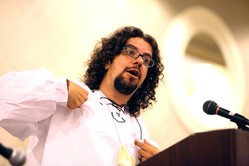“I grew up singing Scottish songs. I grew up praying Scottish prayers,” Claudio Carvalhaes said, taking to the podium in full Scottish regalia.
While his Big Tent audience reacted with laughter, he called himself “a Brazilian cucuracha” who means to challenge poor, marginalized and Christians of color to prove that “justice, freedom and love could actually live together” in a transformed Presbyteian Church (U.S.A).
The provocative theologian and liturgist, a professor at Lutheran Theological Seminary in Philadelphia, preached during a worship celebration at a luncheon jointly sponsored by the Racial Ethnic and Immigrants Convocation and the National Multicultural Church Conference.
He began by describing Pentecost, when a truly multicultural gathering of the earliest Christians were transformed. His text was from Acts 2: “When the day of Pentecost had come, they were all together in one place.” He said his luncheon audience may be moved by the Holy Spirit during the current Big Tent gathering of nearly 1,400 Presbyterians all together in one place.
“We are all Pentecostals now,” said the excitable Carvalhaes. “We are hot and we bring fire that will challenge this way of being a church. …We must all go home and make things go on fire, too. …This church is yours. You do whatever you want.”
Despite his challenging tone, he urged his listeners to join him in “singing harmony for the Beloved Community.”
“You light my fire, I light your way,” he said. “You light my way, I light your fire. That way, together, we build the ‘Beloved Community,’” That ideal, he said, cannot be reached unless justice is a priority.
He challenged his audience to serve justice and prove that “justice, freedom and love could actually live together.”
“We are speaking now from the margins,” he said. “We are local theologians. … We learned our hermeneutics from the kitchens of our mothers. We are people who worship for more than an hour, the people who sing too much and take too long to tell our stories. Just normal people worshiping God.”
What the church must do, Carvalhaes said, is make it include and do justice to “women, natives, blacks, whites, grays, blues and purple people.”
“One thing we need to face,” he said, “well, some call it politics. I call it racism. … Every time I talk about Jesus, I must also talk about Trayvon Martin. Every time I talk about God, I am also talking about Trayvon Martin.”
Also, and first, he said, “we must call ourselves on our own racism.”
He railed against recent cuts of Food Stamp funds from the Farm Bill in Congress, against the fact that “two percent of people in this country have more money than the other ninety-eight” and the prolonged debate over immigration reform.
“We must go south and tear this wall down,” Carvalhaes thundered. “We must turn this wall into bridges.”
He also drew an ovation when he mentioned “unequal salaries for pastors of the church,” some of whom, he said, earn $100,000 or $200,000 a year while his students at the seminary are forced to serve where they earn $10,000 a year. “We have to be equal,” Carvalhaes said, “because it’s a call, not … a salary package.”
He urged his listeners to join him in “a relentless pursuit for justice,” adding: “Don’t let the system tear us apart, or turn us against one another.”
“Our singing will always be dissonant,” Carvalhaes said. “Sing our dissonant songs from the margins, where Jesus is, always. The Beloved comes where the poorest of us live.”

